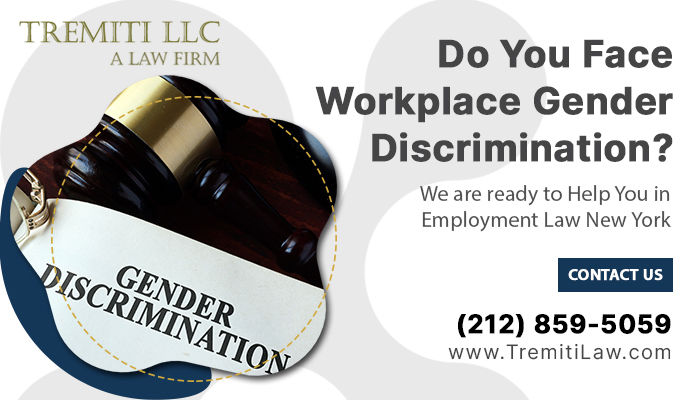Do you Face Workplace Gender Discrimination ?
- Usha Sorkin
- Jun 1, 2023
- 3 min read
Gender discrimination is still prevalent in workplaces despite efforts to combat it. Even with laws that prohibit it, some employers or co-workers might consciously or subconsciously engage in discriminatory behaviors towards colleagues based on their gender. If you are facing workplace gender discrimination so you should contact an expert attorney as soon as possible so that he can tell you a perfect solution, so today I will tell you who can get you out of this problem. Their name is Tremiti Law Firm and they have many years of knowledge and experience. Experience is also very important for your case. They have taken such cases in the past as well and have won them. You must contact at (212) 859-5059 them once for your case.
What is Gender Discrimination?
Gender discrimination towards women is based on the idea that they are inferior to men and should not be given the same opportunities or treated with the same respect as their male counterparts. This can manifest in different ways, such as lower salaries, fewer opportunities for advancement, and being subjected to gender stereotypes that limit their potential.
There are various sorts of workplace gender discrimination:
1. Unequal Pay
Women historically have earned less money than men. This gap still exists today, even for women who hold the same job title and have the same qualifications as their male peers.
2. Passed Over for Promotions
Despite being qualified for a promotion, women often get passed over for male colleagues with less experience or fewer qualifications. This trend is also frequently known as the "glass ceiling" phenomenon.
3. Sexual Harassment
Inappropriate comments or actions of a sexual nature made by colleagues can create a hostile work environment for women. Unfortunately, sexual harassment is still more common than people think.
4. Appearance-Based Discrimination
Discrimination based on appearance can be more subtle than other forms but can still negatively impact women in the workplace. Women face expectations about their appearance that male colleagues do not, and being judged on those expectations can cripple chances of career advancement.
How to Recognize Gender Discrimination in the Workplace
Identifying gender discrimination can be challenging, particularly for those who do not know what to look for. The following are some signs that gender discrimination occurs in the workplace:
1. Systematic Exclusion
If certain jobs, sectors or promotions are deemed "men's jobs" or not something that women are "suited" for, that's a significant red flag.
2. Unfair Policies
Policies that unfairly target women can be a sign of gender-based discrimination. These policies might include requiring women to wear makeup or high-heels, or expecting them to take on duties that men are not held liable for.
3. Unequal Treatment
Women employees who are not entitled to the same privileges as their male colleagues despite holding the same seniority levels and qualifications may be proof of gender-based discrimination.
4. Inappropriate Comments
Inappropriate and discriminatory comments made by colleagues are still too common. Calling out such comments in the workplace is an important first step in fighting gender-based discrimination.
Discrimination Law and Your Rights
Women have legal rights that protect them against gender-based discrimination in the workplace, but only if women know and exert these rights. Federal laws, such as the Civil Rights Act and the Equal Pay Act, exist to protect women from job discrimination in all phases of employment, including hiring, promotions, and termination.
In addition to those federal laws, it is important to note that some states have strengthened legal protections on women's rights, like pregnancy accommodations, equal pay, and tackling the salary gap.
What to Do If You Experience Gender-Based Discrimination
If you experience gender discrimination in the workplace, there are several options available for action. The first may be to confront the issue yourself. If that is not effective, consider working with a union or professional organization to remedy the situation. The Equal Employment Opportunity Commission is also an outlet for those seeking recourse for gender-based discrimination at work. Making a complaint to the EEOC should one occur is vital in helping to bring companies to account for discriminatory practices and improve working conditions for all women employees.
Conclusion
Women today still face gender-based discrimination in the workplace despite the changes in employment law and social attitudes. Raising awareness of gender-based discrimination and signaling its existence in a workplace is crucial to secure improved treatment in the workplace, provide women the professional respect they deserve, and create a future that is fairer for all.
Contact Us :- Employment Law Attorney New York




Comments